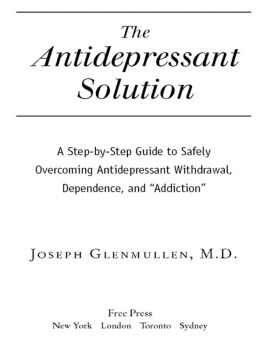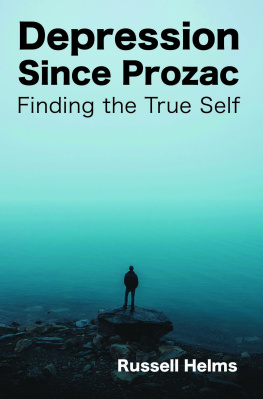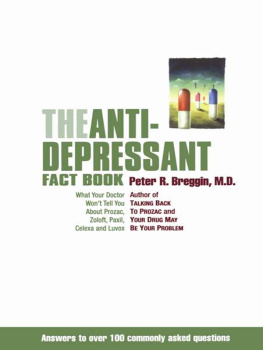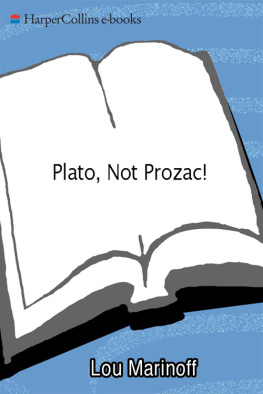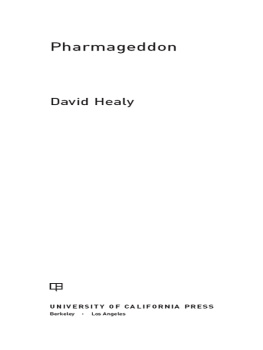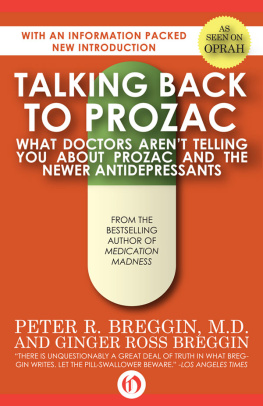LET THEM EAT PROZAC
MEDICINE, CULTURE, AND HISTORY
Series Editor: Andrea Tone
Let Them Eat Prozac
The Unhealthy Relationship between the
Pharmaceutical Industry and Depression
David Healy
DAVID HEALY
LET THEM EAT PROZAC
The Unhealthy Relationship between the
Pharmaceutical Industry and Depression
NEW YORK UNIVERSITY PRESS
New York and London
www.nyupress.org
2004 by New York University
All rights reserved
Library of Congress Cataloging-in-Publication Data
Healy, David, MRC Psych.
Let them eat Prozac : the unhealthy relationship between
the pharmaceutical industry and depression / David Healy.
p. cm. (Medicine, Culture, and History)
Includes bibliographical references and index.
ISBN 0-8147-3669-6 (cloth : alk. paper)
1. Serotonin uptake inhibitors. 2. Fluoxetine.
3. Depression, MentalChemotherapy. 4. Psychotropic drugs industry.
[DNLM: 1. Fluoxetineadverse effects. 2. Depressive Disorder
drug therapy. 3. Drug Industryethics. 4. Fluoxetinetherapeutic use.
QV77.5 H434L 2004] I. Title. II. Series.
RM332.H423 2004
616.8527061dc22 2004002297
New York University Press books are printed on acid-free paper,
and their binding materials are chosen for strength and durability.
Manufactured in the United States of America
10 9 8 7 6 5 4 3 2 1
For Justin
Whose ability to get to the heart of the matter
Ive tried to copy
Carpenters Boat
The new wood as old as carpentry
Rounding the far buoy, wild
Steel fighting in the sea, carpenter,
Carpenter,
Carpenter and other things, the monstrous welded seams
Plunge and drip in the seas, carpenter,
Carpenter, how wild the planet is .
George Oppen, 1962
Contents
Acknowledgments
I have always tried to fit my acknowledgments into a transport metaphor. At one point it looked as if the only metaphor that would do for this book was a solo skiff on a whitewater river, or a battered raft complete with bewildered souls who had lost children, parents, partners, or friends. But things changed, and this book now owes more to the efforts of others than anything else Ive written. These have not been efforts to check the grammar or the facts but rather real risk-taking by many people. Among the thousands whose lives have been torn apart by SSRI antidepressants were Tim Tobin, Bill and Susan Forsyth, Linda Hurcombe, and Fiona Lindsay. Of the many who have learned what academic freedom really means, those on the same bit of river as I included Nancy Olivieri, Brenda Gallie, Helen Chan, Alison Hudgins, Rhonda Love, Peter Durie, and John Dick.
While most of us floundered, a few who had been there before knew what to do. These included Cindy Hall, Karen Barth, Skip Murgatroyd, Andy Vickery, Rhonda Hawkins, Nancy Zettler, Jim Turk, Rosemary Morgan, Peter Rosenthal, Kik and Charlie Roach. There were others, but these stood out.
Downriverwhen the going got really wild, and no one should have even thought about helping outTom Ban, Ned Shorter, Cyril Greenland, Trudo Lemmens, Mona Gupta, Bruce Charlton, and Charles Medawar not only thought about helping but also came on board, and without their contributions the journey would have ended far earlier.
Many people managed to throw lines to the raft at critical points, keeping it on course. These included Julie Axelrod, Ross Baldessarini, Raymond Battegay, Per Bech, German Berrios, Tom Bolwig, Arvid Carlsson, Gaston Castellanos, Jonathan Cole, Leon Eisenberg, Joel Elkes, Giovanni Fava, Max Fink, Alfred Freedman, Peter Gaszner, Abraham Halpern, Turan Itil, Gordon Johnson, Joseph Knoll, Toshihiro Kobayakawa, Brian Leonard, Isaac Marks, Robin Murray, David Nutt, Merton Sandler, Mogens Schou, Pierre Simon, Solomon Snyder, Costas Stefanis, Fridolin Sulser, Gabor Ungvari, and Herman van Praag.
I also got huge amounts of help from Carl Elliott, David Antonuccio, Elizabeth Young, Richard Tranter, Franoise Bayliss, Richard De-Grandpre, Cedric Knight, Max Lagnado, Terry Maltsberger, Mervyn Whitford, Mariam Fraser, and Nikolas Rose, and latterly from Bob Whitaker, Vera Hassner Sharav, Andrew Herxheimer, Bill Bruneau, Andrea Tone, and Alison Waldenberg.
Many people working in the pharmaceutical industry will know that this is not a book hostile to industry but rather one that has received huge input from colleagues working in that industry. We have all been operating under the thundercloud of a common experience.
Sarah Boseley, Anne McIlroy, Duncan Dallas, Marc Edwards, and Vicky Marriott provided key coverage at critical points early in this whitewater journey, and more recently Shelley Jofre and Andy Bell have contributed hugely.
Back at base, as ever, wereamong many othersDinah Cattell, Jackie Thomas, and Tony Roberts.
I owe a special debt to the Canadian Association for University Teachers (CAUT), who picked up my case at a critical point. They owed nothing to a foreigner but responded to the principle, even though this lay outside their brief. I am particularly pleased that all royalties from this book will go into an academic freedom charitable fund within CAUT.
I still have no idea whether this river is about to level out around the bend of publication or if this raft will drop over a waterfall. Responsibility for a big drop is clearly not mine alone, but equally clearly, none of the responsibility lies with anyone else mentioned in this acknowledgment.
Preface
Under the Thundercloud of a Common Experience
The woman sitting in my office was a year or two younger than me. She had written some weeks before to ask if she could visit me to discuss what had happened to her husband.
Gordon, who was almost exactly my age, was a career highflier who could anticipate being promoted to the top of his profession within a few years. But, as in many walks of professional life in the 1990s, reorganization and cost-containment exercises faced him and his colleagues with uncertainties. Jane could see the pressure on him and wondered if anything could be done to help. A year previously Gordon had accompanied Jane, at her suggestion, to see their local general practitioner (GP). Gordon was not a man to seek medical help. His entire medical record consisted of a few lines. There was little in anyones account of him to think he had a depressive illness, but his GP made a working diagnosis of depression, prescribed Prozac, and asked him to come back in two weeks. Jane could remember no warnings about hazards.
Within twenty-four hours, by her account, he was having difficulty. Even though it was the middle of winter, he complained of the heat and asked for the windows to be opened. He seemed unable to sit down. These problems continued over the weekend. A friend, Alice, left her children over to play with Gordons children on Sunday. After collecting her children, Alicea primary-care practitionermentioned to her husband that she was worried about Gordon, who didnt look himself.
Gordons colleagues described him as obviously restless and unable to focus the following day at work. On Monday night, he stayed up changing doorknobs and doing other nonurgent small jobs until the early hours of the morning. Tuesday he went for a haircut before leaving for a meeting some miles away. On his return home, he went up to his study on the fourth floor to get his papers for the meeting. Except for further complaints about the heat, which had led him to open the study window, nothing seemed amiss to his wife that morning. She went downstairs to make him tea. Suddenly she heard a thump on the ground outside. Her husband was lying on the concrete in front of her, dying. Her questionwhat had happened to him?


